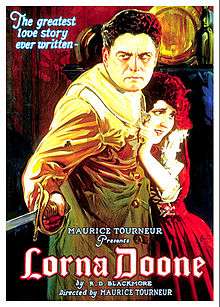Lorna Doone (1922 film)
Lorna Doone is a 1922 American silent drama film based upon Richard Doddridge Blackmore's novel of the same name.[1] Directed by French director Maurice Tourneur in the United States, the film starred Madge Bellamy and John Bowers.[2]
| Lorna Doone | |
|---|---|
 Poster | |
| Directed by | Maurice Tourneur |
| Produced by | Maurice Tourneur Thomas H. Ince |
| Written by | Katherine S. Reed Cecil G. Mumford Maurice Tourneur Wyndham Gittens |
| Based on | Lorna Doone by Richard Doddridge Blackmore |
| Starring | Madge Bellamy John Bowers Frank Keenan Jack McDonald |
| Music by | Mari Iijima (2001 remaster) |
| Cinematography | Henry Sharp |
| Distributed by | Associated First National Pictures |
Release date |
|
Running time | 7 reels |
| Country | United States |
| Language | Silent (English intertitles) |
This is one of many film adaptations of the novel. It was filmed twice before in 1912 in England for Clarendon, and in 1915 for the American Biograph Company.[3] Other later adaptations include 1934 and 1951 films, and 1990 and 2001 television movies.
Cast
- Madge Bellamy as Lorna Doone
- Mae Giraci as Lorna as a Child (credited as Mae Giracci)
- John Bowers as John Ridd
- Charles Hatton as John as a Child
- Frank Keenan as Sir Ensor Doone
- Jack McDonald as 'Counsellor' Doone (credited as Jack MacDonald)
- Donald McDonald as Carver Doone
- Norris Johnson as Ruth, John's Cousin
- Gertrude Astor as Countess of Brandir (uncredited)
- James Robert Chandler as Frye (uncredited)
- Irene De Voss as Lorna's Mother (uncredited)
- Joan Standing as Gwenny Carfax (uncredited)
_-_2.jpg)
- Lenore B. English as "childhood friend" of Lorna Doone <Ms. English, actor, now 101 yrs old (2015), remembers being in this film>
Restoration
In 2001 a digital restoration of the film was financed by Georgia cinephile Jesse Sharp and released on DVD by Kino International. Japanese singer/songwriter Mari Iijima composed an all-new musical score for the film.[4]
Critical reception
In a contemporary review, Variety wrote, "Madge Bellamy has just the right wistful quality of beauty for Lorna...the histrionic honors, however, go to that best of character portrait makers, Frank Keenan, as Sir Ensor Doone...The scenic features of the picture have been splendidly managed. The stagecoach inn might have been lifted from an authentic print of the times. The spirited passage of the coach robbery on the seashore is a smashing bit of pictorial emphasis and the action in the robber's village is scenically impressive."[5]
References
- "Lorna Doone". BFI.
- "Lorna Doone (1922) - Trailers, Reviews, Synopsis, Showtimes and Cast - AllMovie". AllMovie.
- "Silent Era : Progressive Silent Film List". silentera.com.
- "Lorna Doone the soundtrack". All Music. Retrieved 15 July 2016.
- "Lorna Doone". Turner Classic Movies.
External links
| Wikimedia Commons has media related to Lorna Doone (1922 film). |